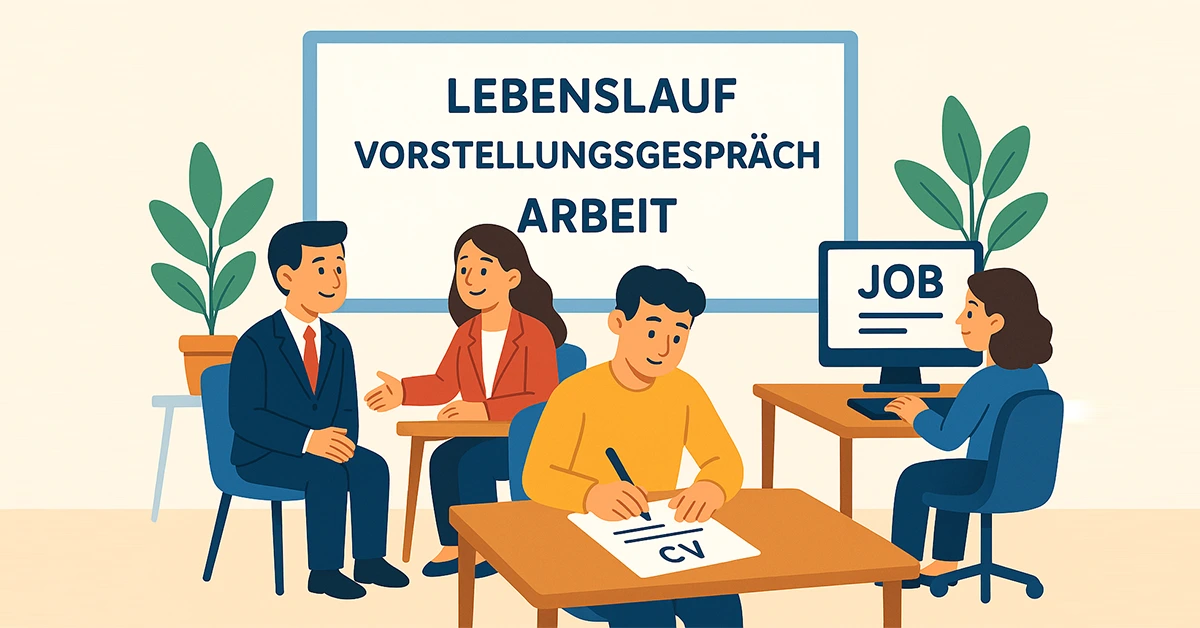German for Work – Must-Know Phrases and Job Vocabulary

Learning German for Work can significantly increase your chances of success in Germany’s job market. In this article, you’ll discover key vocabulary, example phrases, and cultural tips that will help you confidently navigate the German workplace.
Why Learning German for Work Is Crucial for Job Seekers
Learning German for Work is essential for job seekers aiming to build a successful career in Germany. It helps you understand job advertisements, communicate during interviews, and integrate smoothly into the workplace.
How Much German Do You Really Need for Different Jobs?
Jobs in hospitality or delivery might require only A2 level German, while office jobs or technical roles may demand B1-B2 proficiency. Always check the job description for required language skills.
Types of Jobs in Germany Where Basic German Is Enough
- Küchenhilfe (kitchen help)
- Lagerarbeiter (warehouse worker)
- Reinigungsdienst (cleaning staff)
- Lieferfahrer (delivery driver)
Common German Words You’ll See in Job Ads (Stellenanzeigen)
| German | Pronunciation | English |
|---|---|---|
| Vollzeit | /ˈfɔltsaɪt/ | Full-time |
| Teilzeit | /ˈtaɪltsaɪt/ | Part-time |
| Befristet | /bəˈfrɪstət/ | Temporary |
| Unbefristet | /ˈʊnbəfrɪstət/ | Permanent |
Key Vocabulary for Job Search and Applications in Germany
- Bewerbung – Application
- Lebenslauf – CV/resume
- Stellenangebot – Job offer
- Arbeitsvertrag – Work contract
German Job Titles and Office Hierarchies Explained
Understand terms like Praktikant (intern), Mitarbeiter (employee), Abteilungsleiter (department head), and Geschäftsführer (managing director).
Essential German Greetings and Self-Introductions for Work Settings
Example: Guten Tag, mein Name ist Sarah Müller. Ich freue mich, hier zu sein.
Good day, my name is Sarah Müller. I’m happy to be here.
Top German Phrases to Use in Job Interviews
- Ich bin sehr motiviert, in Ihrem Unternehmen zu arbeiten. – I’m very motivated to work in your company.
- Ich habe Erfahrung in … – I have experience in …
Talking About Your Skills and Work Experience in German
Ich habe drei Jahre als Softwareentwickler gearbeitet.
I worked for three years as a software developer.
Useful German Phrases for CVs and Cover Letters
- Sehr geehrte Damen und Herren – Dear Sir or Madam
- Mit freundlichen Grüßen – Yours sincerely
How to Understand Job Contracts in German – Key Terms
- Arbeitszeit – Working hours
- Gehalt – Salary
- Kündigungsfrist – Notice period
Formal and Polite German Phrases for the Workplace
Darf ich Sie kurz stören? – May I disturb you briefly?
Essential German Phrases for Office Communication
Könnten Sie das bitte wiederholen? – Could you please repeat that?
Polite Ways to Ask Questions and Make Requests in German
Wären Sie so freundlich, mir das zu erklären? – Would you be so kind as to explain that to me?
Professional German Phrases for Emails and Work Messages
- Ich hoffe, es geht Ihnen gut. – I hope you’re doing well.
- Vielen Dank für Ihre Rückmeldung. – Thank you for your feedback.
Speaking German with Coworkers: Small Talk and Daily Interactions
Wie war dein Wochenende? – How was your weekend?
Handling Conflicts and Giving Feedback in German Professionally
Ich möchte ein konstruktives Feedback geben. – I’d like to provide constructive feedback.
German for Remote Work – Phrases for Online Meetings and Emails
Können Sie mich hören? – Can you hear me?
Ich werde das in einer E-Mail zusammenfassen. – I’ll summarize this in an email.
Workplace Etiquette in Germany – What You Should Know
Be on time, use formal titles, and respect hierarchy unless told otherwise.
Continuing Your Career Growth – German for Training and Workshops
Example: Ich nehme an einer Fortbildung teil. – I’m participating in a training course.
Job Interview Tips and Cultural Norms in Germany
- Be punctual
- Dress formally
- Use formal language (Sie instead of du)
Important Abbreviations and Acronyms Used at German Workplaces
- AG – Arbeitgeber (employer)
- MA – Mitarbeiter (employee)
- AZ – Arbeitszeit (working hours)
Download the Free PDF: Job-Related German Phrases
Click here to download your free PDF with all job-related German phrases.
Conclusion: Start Using German for Your Career Today
Learning German for Work is a powerful step in your professional journey. With these phrases, you’ll boost your confidence, connect better with colleagues, and increase your chances of finding a job in Germany.
Explore More Professional Vocabulary
FAQs: Speaking German at Work as an Expat in Germany
Do I need to speak German to find a job in Germany?
While it’s possible to find English-speaking jobs, speaking German significantly increases your job opportunities and helps you integrate better into the workplace.
What level of German is needed for most jobs in Germany?
Most employers expect at least a B1 level of German for professional roles. For customer-facing jobs, a B2 or higher is often required.
How can I improve my German for work quickly?
You can speed up your learning by focusing on work-specific vocabulary, practicing daily conversations, and using language apps tailored for professionals.
Are there formal vs. informal ways of speaking in German workplaces?
Yes. In German work culture, formal language (using “Sie”) is the norm, especially when speaking to colleagues, supervisors, or clients.
Where can I find a list of useful German phrases for my job?
You can download our free PDF guide with job-related German phrases directly from this page, covering everything from interviews to emails.